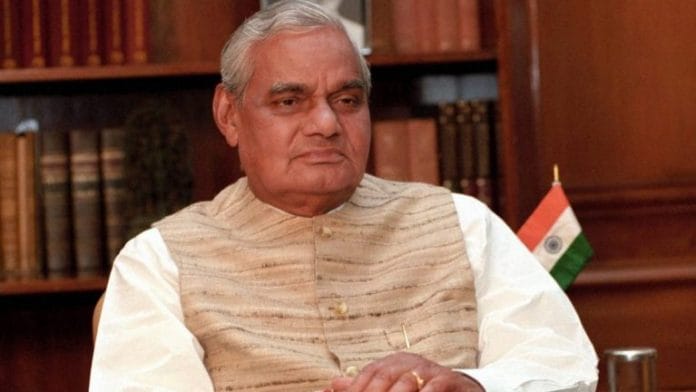I have a vivid memory of a gleeful and beaming laugh of the great statesman and leader, former prime minister Atal Bihari Vajpayee, who was born on this day in 1924 in Gwalior. An affable personality, Vajpayee would express his love for Mithila’s Rohu and his appreciation for Maithili language. As renowned he was for his eloquence and poetry, his presence would draw the masses as well as reassure those in high offices. His poem ‘Kadam mila ke chalna hoga’ symbolised his approach in life about collaborative endeavours for nation building. His poems would often describe India as a nation of cultural pluralism and synthesis.
There was an underlying theme of national vision and a common consensus on ideas of inclusiveness, social justice, and annihilation of discriminatory policies and practices in his writings, which shaped much of modern policy as we know it. The Sarva Shiksha Abhiyan, which was a revolutionary step in primary education, was advertised through a song written by Mehboob ‘School Chale Hum’ which soon became an anthem for kids like us who were only just learning about Vajpayee, who has built a nostalgic memory for children of the early 2000s.
Vajpayee was a charismatic personality in Indian politics. For me, his name Atal represents a person who was ‘Assimilative’, ‘Transformative’, ‘Assertive’, and someone whose ‘Leadership’ is unparalleled. His entire political life—since 1957 to 2004—as people’s representative in Lok Sabha from Balrampur in Uttar Pradesh is a constant reminder of how public interest can be incorporated in Indian democracy.
Also read: Why a liberal Indian needed to write Atal Bihari Vajpayee’s biography
Transforming India
Vajpayee’s ‘assimilative’ nature driven by his equanimity and sense of fair play often surprised his opponents. It was this particular quality of his that nurtured and protected Indian democracy, despite the overwhelming dominance of Congress in every aspect of governance. It won’t be wrong to say that it was Vajpayee’s assimilative politics that led Indian democracy out of the Congress’ dominance by shaping and carving multilateralism and collaborative politics of Bharatiya Janata Party (BJP)-led National Democratic Alliance (NDA).
The ‘transformative’ aspects of Vajpayee’s personality, particularly in governance, could be traced to the key decision he took in order to transform India. Being the first non-Congress prime minister to complete a full term in office, Vajpayee led India’s nuclear capacity to a whole new scale. An erudite and connoisseur of Hindi and Sanskrit languages, Vajpayee is also credited with taking Hindi to a global platform when he addressed the United Nations General Assembly on the issues of national importance.
A man of innovation and ideas, Vajpayee has also made remarkable contributions to the field of science and technology during his tenure. The New Telecom Policy of 1999 brought a revolution in the field of modern telecommunication and in 2003, he announced India’s first unmanned moon exploration mission-Chandrayaan I. The Electricity Act 2003 transformed India’s power sector, and then there were housing schemes on low interest rates, public finance management reform through the Fiscal Responsibility and Budget Management Act 2003, programmes for road networks that remain a high marker of his visionary and transformative nature.
Also read: Vajpayee’s demise is not the end of an era, but the continuation of one: Arun Jaitley
Shaping Indian politics
Such transformative programmes also reflect an ‘assertive’ nature of the former prime minister. The excellence in his leadership quality was visible by the fact that every section of the society and politics was moved by his death. This shows he was not just a leader with a vision to provide new direction to Indian politics, but also a leader who could shape the social fabric of the nation by providing space to those on the margins. He inducted Dalit leaders like Dr Sanjay Paswan as ministers in the information and broadcasting, and human resource development ministries, whose custodians were generally people from the upper echelons of political spectrum.
Dr Paswan recalls his several encounters and experience of working with Vajpayee, and says his social philosophy and vision was inclusive and plural in nature. “Vajpayee acknowledged every section of society and their cultural tradition and its incorporation into social life for a holistic nation building,” he said. “It is re-assuring that NDA under PM Narendra Modi has not only continued this tradition but also nurtured it to give the most assimilative cabinet this country ever had with equal representation to Dalits, Adivasis and backwards,” Dr Paswan added.
All this shows Vajpayee’s commitment to fill every Indian’s life with dignity, self-respect and confidence towards their community and its traditions. Vajpayee’s philosophy was that society should remember the icons who had made contributions and sacrificed themselves for the empowerment and welfare of this nation. It speaks of his great legacy that several aspects of his personality continue to live on and shape Indian society and politics.
To remember him, we can go back to a line from one of his poems, which has left an indelible mark one me: “Chote man se koi bada nahi hota. Tute man se koi khada nahi hota…”
The author is an assistant professor of sociology at Lakshmibai College, Delhi University. She tweets @AditiNarayani. Views are personal.
(Edited by Prashant)







Great article , congratulations to you .